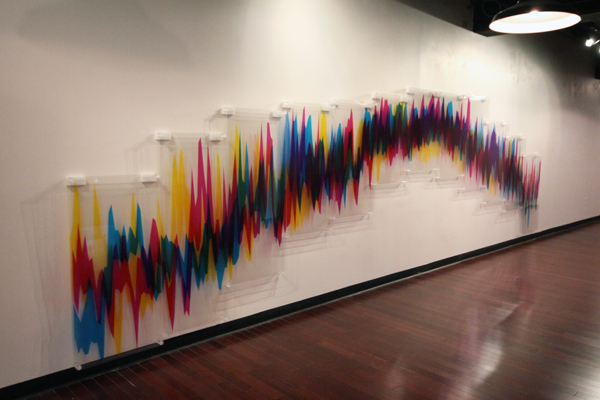Speaking of conceptual weather art ... here's my review of ˚ by Stephen Cartwright and Andrew James, at the Luminary Center for the Arts in St. Louis.
Thursday, April 26, 2012
Tuesday, April 24, 2012
What is it with
conceptual poetry and weather?
Well, maybe there isn’t
that much conceptual weather poetry. But there is some. (As well as some
conceptual weather art—more on this soon.)
While making my way
through Craig Dworkin and Kenneth “The Weather” Goldsmith’s Against Expression: An Anthology of Conceptual Writing (which I find by turns thrilling and numbing—what
makes good conceptual writing?—a simple concept, surely, and a degree of art, accidental or otherwise—not
everyone will agree) I came across an excerpt from Gregory Betts’s If Language, exactly the kind of
conceptual work I most enjoy. As it happens, the excerpt in Against Expression includes a weather poem. First, though, this is
how it works: each of the fifty poems in If
Language is a different arrangement of the same 525 letters in a passage from
an essay by Steve McCaffery. To give you a sense of what this is like, here is
the McCaffery passage:
If Language Writing successfully detaches Language from the historical purpose of summarizing global meaning, replacing the goal of totality with the free polydynamic drive of parts, it nevertheless falls short in addressing the full implications of this break and seems especially to fail in taking full account of the impact of the human subject with the thresholds of linguistic meaning. It is at the critical locus of productive desire that this writing opens itself up to an alternative “libidinal” economy which operates across the precarious boundaries of the symbolic and the biological and has its basis in intensities.
And here is Betts’s
weather poem:
Today it will be music degrees of collage with a litter of sun petroleum and solace, hi-fi of sickishness, obliged by a conservative force that, it is hopeful, will fulminate in the social realities of committed principalities. Someone’s parents slip back into an ungracious war front that agitates the alliance and physiognomy of illuminating gases threatening shift. By tonight, at the mausoleum parade, the light scoffing carbuncular air should eroticize its partly visible superobjectivism. Plush gallows hiss. There is a fifty percept chance of fifth and eighth dimensions contrasting that should clear up all things considered.
I am amazed at the
virtuosity of Betts’s anagrams. (I should also mention that the blurb for If
Language, by the conceptual writer Christian Bök, is an anagram of the McCaffery passage, as well.) To my eye (my
ear, my mind) this poem is just, well, perfect. I especially like “hi-fi of
sickishness,” “the mausoleum parade,” and “the light scoffing carbuncular air
should eroticize its partly visible superobjectivism”—although I can’t say
particularly why I like it. It reminds me that every word is an arrangement of
letters, every sentence an arrangement of words, and that arrangement itself is
meaningful, even when I don’t know exactly what this arrangement of letters and
words means. (I’m typing this in Microsoft Word, and I’m kind of tempted to
turn on the grammar check, to see what it makes of Betts’s sentences.)
Betts’s poem is like a
weather forecast, right? But how? I’ve struggled to find a way to say this. The
same is true of parts of Clark Coolidge’s “Weathers.” There’s a passage that
begins, “Partly stone only to see beneath red slips. The fishing particle, on
and off, innards of glass. Sun parts hardly, seems to move.” That “partly stone”
and “sun parts hardly” suggest something like “partly sunny”—and of course,
rain, snow, wind and so on are often “on and off.” Coolidge misstates the weather forecast; Lisa Robertson
might say he quotes it wrongly. Betts
does this, too: “Today it will be music degrees of collage with a litter of sun
petroleum and solace, hi-fi of sickishness, obliged by a conservative force
that, it is hopeful, will fulminate in the social realities of committed
principalities.” Today it will be 90 degrees with scattered rain and wind, high
humidity, relieved by a cold front that, we hope, will mean cooler temperatures
over the weekend. Something like that, right?
In part, it’s this—not knowing what, exactly, is familiar and how—that makes the poem uncanny, and beautiful.
(I’m plotting a
conceptual weather poem of my own. Stay tuned.)
Subscribe to:
Comments (Atom)

